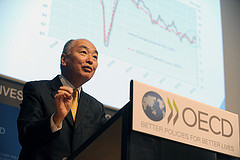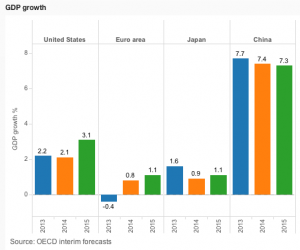Advanced, emerging economies expanding, says OECD
Posted by Elena del Valle on September 24, 2014

Rintaro Tamaki, deputy secretary general, OECD
Photo, graphic: OECD/Michael Dean
Most major advanced and emerging economies are experiencing a moderate if uneven expansion across regions; and growth is weak in the euro area, which may suffer prolonged stagnation unless something happens to boost demand, according to the Organisation for Economic Co-operation and Development’s (OECD) most recent Interim Economic Assessment.
In the United States, the United Kingdom and Canada, the researchers believe growth will be cause unemployment to drop. In Japan, where unemployment is already low, the economy may grow broadly. They believe China will to continue experiencing high yet more sustainable growth rates while India and Brazil rebound from the recession.
“The global economy is expanding unevenly, and at only a moderate rate,” said Rintaro Tamaki, deputy secretary general and acting chief economist, OECD, at the Interim Economic Assessment in Paris, France, according to the OECD website. “Trade growth therefore remains sluggish and labour market conditions in the main advanced economies are improving only gradually, with far too many people still unable to find good jobs worldwide. The continued failure to generate strong, balanced and inclusive growth underlines the urgency of undertaking ambitious reforms.”
OECD Projected GDP Growth 2014-15 – click to enlarge
The OECD projects that in 2014, the United States will grow by 2.1 percent, and by 3.1 per cent in 2015; the United Kingdom will grow by 3.1 percent in 2014 and 2.8 percent in 2015; and Canada will grow 2.3 percent this year and 2.7 percent in 2015.
They estimate Japan will grow by 0.9 percent in 2014 and 1.1 percent in 2015; the euro area will grow at a 0.8 percent rate in 2014 and a 1.1 percent pace in 2015.
Growth prospects differ widely among the major euro area economies. The researchers forecast Germany will grow by 1.5 percent in 2014 and 2015, France by 0.4 percent in 2014 and 1 percent in 2015, while Italy will see a -0.4 percent drop in 2014 and a gain of just 0.1 percent in 2015.










